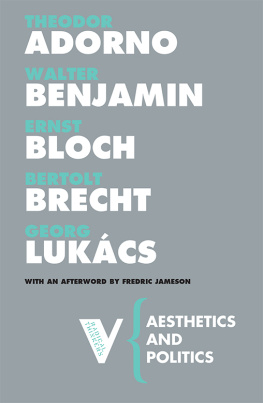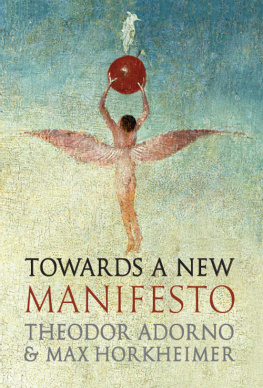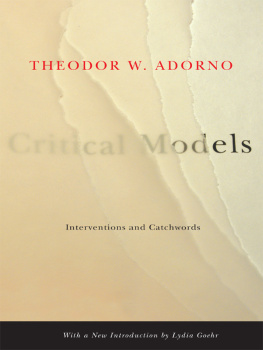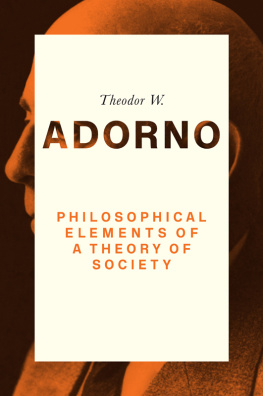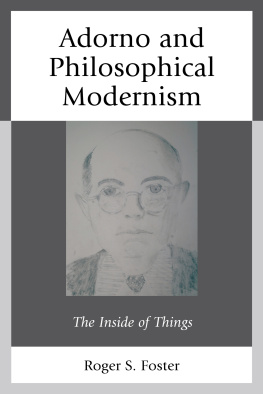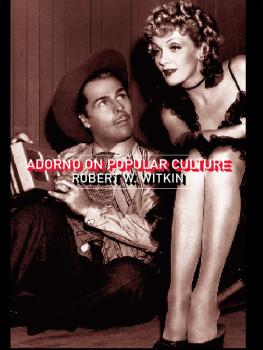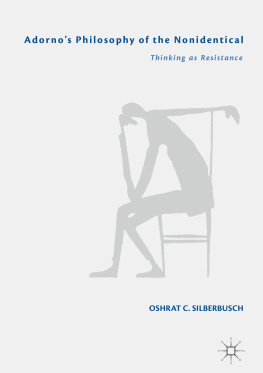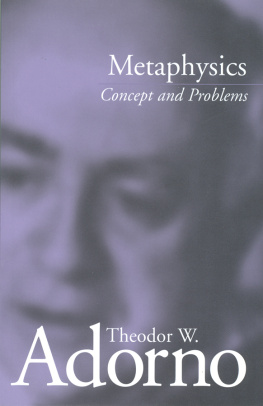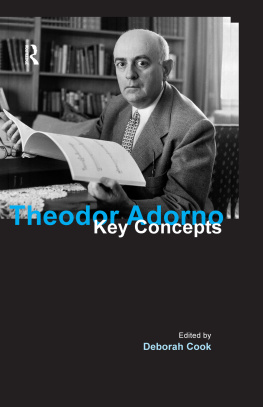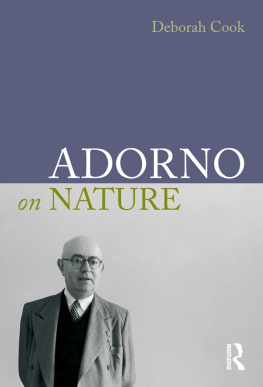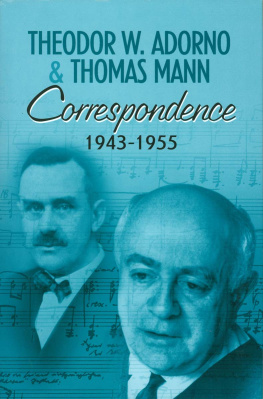Theodor Adorno - Minima Moralia: Reflections from Damaged Life
Here you can read online Theodor Adorno - Minima Moralia: Reflections from Damaged Life full text of the book (entire story) in english for free. Download pdf and epub, get meaning, cover and reviews about this ebook. year: 2006, publisher: Verso, genre: Science. Description of the work, (preface) as well as reviews are available. Best literature library LitArk.com created for fans of good reading and offers a wide selection of genres:
Romance novel
Science fiction
Adventure
Detective
Science
History
Home and family
Prose
Art
Politics
Computer
Non-fiction
Religion
Business
Children
Humor
Choose a favorite category and find really read worthwhile books. Enjoy immersion in the world of imagination, feel the emotions of the characters or learn something new for yourself, make an fascinating discovery.

- Book:Minima Moralia: Reflections from Damaged Life
- Author:
- Publisher:Verso
- Genre:
- Year:2006
- Rating:3 / 5
- Favourites:Add to favourites
- Your mark:
- 60
- 1
- 2
- 3
- 4
- 5
Minima Moralia: Reflections from Damaged Life: summary, description and annotation
We offer to read an annotation, description, summary or preface (depends on what the author of the book "Minima Moralia: Reflections from Damaged Life" wrote himself). If you haven't found the necessary information about the book — write in the comments, we will try to find it.
Minima Moralia: Reflections from Damaged Life — read online for free the complete book (whole text) full work
Below is the text of the book, divided by pages. System saving the place of the last page read, allows you to conveniently read the book "Minima Moralia: Reflections from Damaged Life" online for free, without having to search again every time where you left off. Put a bookmark, and you can go to the page where you finished reading at any time.
Font size:
Interval:
Bookmark:
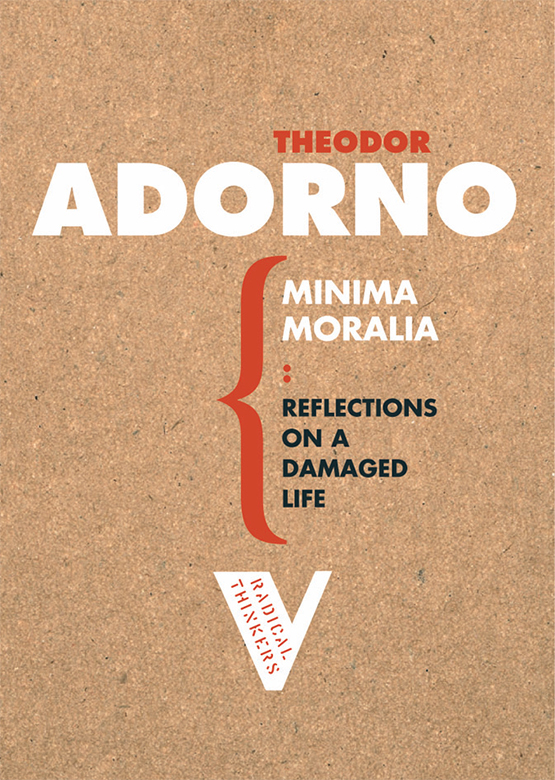
REFLECTIONS ON A DAMAGED LIFE
Theodor Adorno
Translated from the German by E. F. N. Jephcott

Originally published as Minima Moralia by
Suhrkamp Verlag, Frankfurt am Main 1951
Suhrkamp Verlag 1951
Translation first published by New Left Books 1974
NLB 1974
This edition published by Verso 2005
All rights reserved
The moral rights of the author and translator have been asserted
5 7 9 10 8 6 4
Verso
UK: 6 Meard Street, London W1F 0EG
USA: 180 Jay Street, Suite 1010, Brooklyn, NY 11201
www.versobooks.com
Verso is the imprint of New Left Books
ISBN: 978-1-84467-051-2
eISBN US: 978-1-78873-526-1
eISBN UK: 978-1-78873-527-8
British Library Cataloguing in Publication Data
A catalogue record for this book is available from the British Library
Library of Congress Cataloging-in-Publication Data
A catalog record for this book is available from the Library of Congress
Printed in the UK by CPI Bookmarque, Croydon, CR0 4TD
For Max
In gratitude
and promise
The German text of Minima Moralia has no footnotes. Adornos extensive use of literary, musical, philosophical and idiomatic allusions is, however, an integral device of the whole formal structure and style of the book. Explanations of these has seemed essential, where prior knowledge could not reasonably be assumed in English-speaking readers. This edition therefore includes brief decipherments of those implicit or explicit references or citations where a clarification appeared to be necessary. All such footnotes have been added by NLB. The decision when to insert them has often proved difficult. But in general, familiarity with works or figures in German literary history has been assumed to be less widespread among Anglo-Saxon audiences than French references: hence, at risk of superfluity for readers conversant with the former, more information has been provided where echoes of it are concerned. A special problem has arisen with the titles to the aphorisms. These comprise six languages in the original German, English, French, Italian, Latin and Greek. The latter four have been rendered exactly in the form in which Adorno composed them, with accompanying notes. The titles in English, no longer directly visible in translation, are the following: They, the people, Tough Baby, English spoken, Golden Gate, I.Q., Wishful thinking , and Who is who (Nos. 7, 24, 26, 104, 126, 127, 138). Whether in titles or text, the great majority of the allusions in Minima Moralia , as will be seen, involve irony or inversion.
All actual quotations for example, from Hegel or Nietzsche, Goethe or Proust have been newly translated from the original, and footnoted to standard native editions; to help English-speaking readers locate the passages concerned, however, translated editions have been added in brackets in the notes. The only exceptions, where existing English-language translations have been used, are the quotations from Marx and Lukcs towards the end of the book.
The melancholy science from which I make this offering to my friend relates to a region that from time immemorial was regarded as the true field of philosophy, but which, since the latters conversion into method, has lapsed into intellectual neglect, sententious whimsy and finally oblivion: the teaching of the good life. What the philosophers once knew as life has become the sphere of private existence and now of mere consumption, dragged along as an appendage of the process of material production, without autonomy or substance of its own. He who wishes to know the truth about life in its immediacy must scrutinize its estranged form, the objective powers that determine individual existence even in its most hidden recesses. To speak immediately of the immediate is to behave much as those novelists who drape their marionettes in imitated bygone passions like cheap jewellery, and make people who are no more than component parts of machinery act as if they still had the capacity to act as subjects, and as if something depended on their actions. Our perspective of life has passed into an ideology which conceals the fact that there is life no longer.
But the relation between life and production, which in reality debases the former to an ephemeral appearance of the latter, is totally absurd. Means and end are inverted. A dim awareness of this perverse quid pro quo has still not been quite eradicated from life. Reduced and degraded essence tenaciously resists the magic that transforms it into a faade. The change in the relations of production themselves depends largely on what takes place in the sphere of consumption, the mere reflection of production and the caricature of true life: in the consciousness and unconsciousness of individuals. Only by virtue of opposition to production, as still not wholly encompassed by this order, can men bring about another more worthy of human beings. Should the appearance of life, which the sphere of consumption itself defends for such bad reasons, be once entirely effaced, then the monstrosity of absolute production will triumph.
Nevertheless, considerations which start from the subject remain false to the same extent that life has become appearance. For since the overwhelming objectivity of historical movement in its present phase consists so far only in the dissolution of the subject, without yet giving rise to a new one, individual experience necessarily bases itself on the old subject, now historically condemned, which is still for-itself, but no longer in-itself. The subject still feels sure of its autonomy, but the nullity demonstrated to subjects by the concentration camp is already overtaking the form of subjectivity itself. Subjective reflection, even if critically alerted to itself, has something sentimental and anachronistic about it: something of a lament over the course of the world, a lament to be rejected not for its good faith, but because the lamenting subject threatens to become arrested in its condition and so to fulfil in its turn the law of the worlds course. Fidelity to ones own state of consciousness and experience is forever in temptation of lapsing into infidelity, by denying the insight that transcends the individual and calls his substance by its name.
Thus Hegel, whose method schooled that of Minima Moralia , argued against the mere being-for-itself of subjectivity on all its levels. Dialectical theory, abhorring anything isolated, cannot admit aphorisms as such. In the most lenient instance they might, to use a term from the Preface to the Phenomenology of Mind , be tolerated as conversation. But the time for that is past. Nevertheless, this book forgets neither the systems claim to totality, which would suffer nothing to remain outside it, nor that it remonstrates against this claim. In his relation to the subject Hegel does not respect the demand that he otherwise passionately upholds: to be in the matter and not always beyond it, to penetrate into the immanent content of the matter.
The dismissive gesture which Hegel, in contradiction to his own insight, constantly accords the individual, derives paradoxically enough from his necessary entanglement in liberalistic thinking. The conception of a totality harmonious through all its antagonisms compels him to assign to individuation, however much he may designate it a driving moment in the process, an inferior status in the construction of the whole. The knowledge that in pre-history the objective tendency asserts itself over the heads of human beings, indeed by virtue of annihilating individual qualities, without the reconciliation of general and particular constructed in thought ever yet being accomplished in history, is distorted in Hegel: with serene indifference he opts once again for liquidation of the particular. Nowhere in his work is the primacy of the whole doubted. The more questionable the transition from reflective isolation to glorified totality becomes in history as in Hegelian logic, the more eagerly philosophy, as the justification of what exists, attaches itself to the triumphal car of objective tendencies. The culmination of the social principle of individuation in the triumph of fatality gives philosophy occasion enough to do so. Hegel, in hypostasizing both bourgeois society and its fundamental category, the individual, did not truly carry through the dialectic between the two. Certainly he perceives, with classical economics, that the totality produces and reproduces itself precisely from the interconnection of the antagonistic interests of its members. But the individual as such he for the most part considers, naively, as an irreducible datum just what in his theory of knowledge he decomposes. Nevertheless, in an individualistic society, the general not only realizes itself through the interplay of particulars, but society is essentially the substance of the individual.
Font size:
Interval:
Bookmark:
Similar books «Minima Moralia: Reflections from Damaged Life»
Look at similar books to Minima Moralia: Reflections from Damaged Life. We have selected literature similar in name and meaning in the hope of providing readers with more options to find new, interesting, not yet read works.
Discussion, reviews of the book Minima Moralia: Reflections from Damaged Life and just readers' own opinions. Leave your comments, write what you think about the work, its meaning or the main characters. Specify what exactly you liked and what you didn't like, and why you think so.

